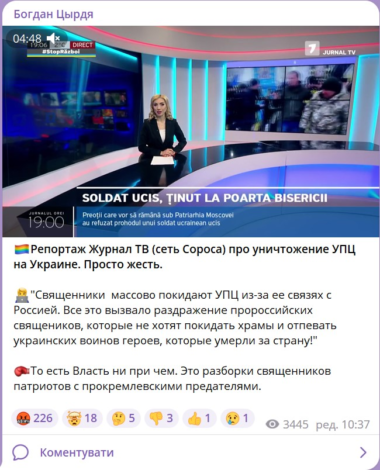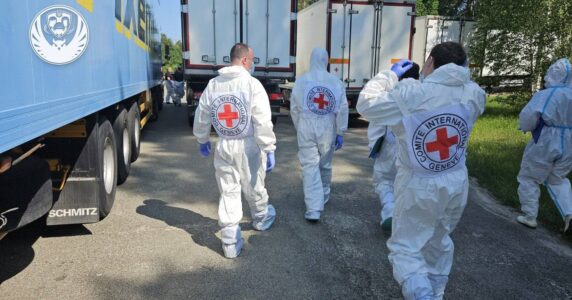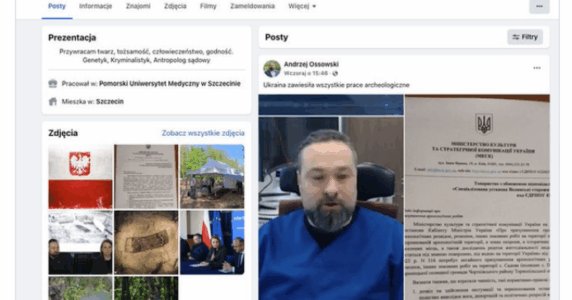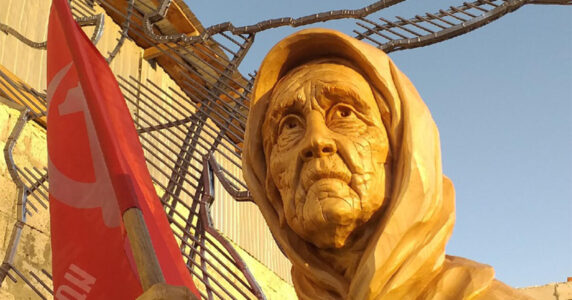Navigation and useful materials
The Centre for Strategic Communication and Information Security, based on the monitoring results of Ukraine War Disinfo Working Group in the period from February 20 to April 30, 2023, studied what dangerous narratives of Russian propaganda get into the information space of the four countries bordering Ukraine in the west — Poland, Moldova, Hungary, and Slovakia (Romania was not included in the monitoring).
Earlier, we analyzed the information space of Central and Eastern Europe to identify the methods used by Russian propaganda in these regions and the messages disseminated based on the results of the monitoring of Ukraine War Disinfo Working Group in the period from June to the end of October 2022.
Hungary
Anti-Western narratives
This group of narratives was mostly focused on the statement that “the war in Ukraine was provoked by the West for its own benefit,” and “the West is using Ukraine as a pawn.”
“The West/NATO provoked a conflict between Ukraine and Russia”
The spread of the narrative that “NATO allegedly provoked the war in Ukraine” persisted.
“The West will fight to the last Ukrainian”
The statements are based on previous pro-Kremlin narratives about the immediate need for peace talks and insist that while Russia seeks “peace,” “the West is ready to continue the war in Ukraine.”
“Russia wants peace, while the West and Ukraine want to continue the war”
This narrative places the responsibility for achieving peace on the West and exempts Russia from guilt. It implies that Russia wants “peace,” and the West and Ukraine stand in the way.
“Countries should not help Ukraine because of their past historical conflicts”
This narrative speaks of “ill-treatment of the Hungarian minority in Ukraine,” which aims to provoke anger towards Ukraine for “ruling Zakarpattia.”
Events on the battlefield
Pro-Russian sources paid considerable attention to military events, promoting the idea that “Ukraine will lose the war, and Russian troops are advancing.” Propaganda regarding events on the battlefield remains focused on Bakhmut as the site of the most intense fighting. The “Ukraine will lose the war” narrative remains key, and reports highlighting Ukrainian losses and downplaying Russian ones to present the Russian army as an advantage remain relevant.
“Ukrainians attack civilians and commit other war crimes”
This is a recurring pro-Kremlin narrative that attempts to claim that “Ukraine is committing war crimes.” Pro-government and far-right sources spread it on the basis of the story that a Ukrainian HIMARS missile allegedly killed 2 civilians in Donetsk Oblast.
“Ukraine will lose the war”
This narrative implies that “Ukrainian defeat is inevitable” and “Russia is steadily succeeding on the battlefield,” and therefore it makes no sense to try to influence the outcome of the war by supporting Ukraine.
According to pro-Kremlin sources, Ukraine “loses Bakhmut” every week for 3 months, and “the Ukrainian counter-offensive will not succeed.” This is being done to undermine Ukraine’s vital military support.
Narratives discrediting Ukraine
This narrative was also partly associated with the events in Bakhmut, promoting the idea that “Ukraine is ill-treating its soldiers.” Such statements were combined with statements on discrimination of ethnic minorities in Ukraine.
Assistance to Ukraine
The most common narrative on aid to Ukraine was “aid to Ukraine weakens/endangers the countries that provide it,” associated with the idea that “Western societies recognize this threat,” and “support for Ukraine weakens.”
In particular, this narrative was common in the context of the transfer of new fighters to Ukraine and anti-government protests in France.
“Military aid unnecessarily prolongs the war/endangers the civilian population”
According to this narrative, Russia allegedly wants “peace,” while Western “warmongers prolong the suffering and conflict,” by constantly sending weapons to Ukraine.
The idea of providing aid to Ukraine is portrayed as “futile” and that only prolongs the war, leading to further suffering.
“Aid to Ukraine weakens/endangers the countries that provide it”
This narrative is recurring, distorting data on military assistance to Ukraine and stating that it escalates or exhausts the resources of Western states, making them weak and ultimately undermining their own security.
Pro-Kremlin actors also establish connections between social problems in certain countries and military aid to Ukraine.
This subnarrative also states that Ukraine is not a sovereign country because of its “financial dependence” on Western states that support it “at the expense of its own citizens.”
Poland
Narratives discrediting Ukraine
The main focus of the narratives discrediting Ukraine was the depiction of Ukrainians as “Nazis.”
The discredit effort also focused on two key areas: accusations of “incompetence” of the Ukrainian leadership, which allegedly “does not care about its soldiers,” and accusations of corruption in Ukraine.
“Ukrainians are Nazis”
Reports accusing Ukraine of Nazism largely relied on quotes of Russian and pro-Russian politicians and their justification for war as necessary to counter Nazism in Ukraine.
“Ukrainian grain undermines Western economies” / “Ukraine sells poor quality/contaminated/too much grain to the West”
Pro-Russian sources in Poland touch upon the topic of sending Ukrainian grain to Europe under low-tax agreements to support Ukraine. Propagandists claim that the grain is “contaminated/of poor quality” or “there is too much of it,” which leads to instability of the local market in Poland.
“Ukraine will not become a NATO member”
This narrative is based on alleged “leaks” from U.S. or NATO structures, claiming that “the U.S. has decided never to allow Ukraine to join NATO.”
Conspiracy theories
Conspiracy theories have focused on portraying the war in Ukraine as part of a global conspiracy, while simultaneously undermining Ukrainian agents and presenting them as “run by the West.”
“The war in Ukraine is part of a global conspiracy”
The war in Ukraine is portrayed as part of a “transnational banking conspiracy” and “a major source of income for the West” that profits from the war-related industry.
The conspiracy also promotes the idea that “the war is being used by the world’s elites as a distraction and a testing ground for the continuation of a secret monetary programme, trying to ban cash and create virtual money to enslave people.”
In addition, other narratives claim that the war in Ukraine is a “conspiracy” and was allegedly “planned for years by the West.” The purpose of these reports is to blame the West for the war in Ukraine and portray Russia as a victim of a transnational, evil conspiracy that provoked a violent war.
Some media sources tend to claim that “the whole war is staged,” ignoring the fact that the two narratives contradict each other.
Ukrainian refugees
These narratives were mostly focused on portraying Ukrainian refugees as a “threat to Poland’s security,” that the Polish government “prioritizes” them over Polish citizens, and that Ukrainian refugees in return are “ungrateful” to the host country.
Ukrainian refugees are portrayed by disinformers as mostly not fleeing war, but as seeking to “profit at the expense of the society that hosts them.”
“Ukrainian refugees abuse aid”
This narrative described how “Ukrainians profit from the aid provided by the governments that host them,” portraying Ukrainian refugees as those “exploiting the sympathies of others.” Such reports are accompanied by accusations against Ukrainians of “their ingratitude and abuse of their position.”
“Ukrainians are demanding and ungrateful”
Propagandistic statements claimed that “Ukrainians are ungrateful, despite the great help of the West.”
Anti-Western narratives
Reports in this category of narratives centred around accusations of pushing the international community into a “world war” by assisting Ukraine. Attempts were made to blur Russia’s responsibility for the aggression against Ukraine and to portray the United States as an “equally responsible party.”

“Western countries aggravate the war”
The narrative is based on the fact that the British government has announced that it will provide Ukraine with armour-piercing shells containing depleted uranium — Russian disinformation is actively criticizing this decision, pointing to the negative impact of such munitions on the environment and threatening the West with an escalation of the war.
“Western countries are under threat of/will be drawn into the war”
The narrative “the government can draw Poland into the war.” The narrative re-emerged again after manipulation of disinformers around the words of Poland’s ambassador to France, Jan Rościszewski, who said that “if Ukraine loses, Poland will have to go to war.” He meant that after the fall of Ukraine, the Baltic countries and Poland would be in direct danger.
Russian disinformation used this sentence taken out of context to prove that Poland was allegedly “planning to start a war.”
“NATO/US/West is or will be directly involved in the war”
General narratives aimed at frightening the public with claims that “the United States is pushing its allies in Europe to war” or “military assistance to Ukraine will lead to the fact that Russia’s ‘countermeasures’ will harm Poland.”
“The West is profiting from the war in Ukraine”
Pro-Russian sources stated that “the West is responsible for starting the war,” and that it did it to “profit from the sale of weapons.”
“Poland will be drawn into the war”
Pro-Russian disinformation channels have intensified claims that “Poland’s support for Ukraine will draw Poland into the war,” and therefore such support is contrary to Polish national interests.
Moldova
Spreading the threat of war beyond Ukraine
These narratives were disproportionately prevalent in Moldova and were mostly associated with Transnistria, which Russian sources described as a potential target for Ukrainian provocations.
Anti-Western narratives
The spread of these narratives was based, in particular, on Donald Trump’s statements that he was ready to accept Ukraine’s territorial surrender to Russia, as well as Hungarian authorities accusing NATO and the EU of “interfering” in the war.
“Sanctions harm the West more than Russia”
For example, images from the Munich protests against high inflation have been disseminated as “proof” that ordinary Westerners suffer more because of anti-Russian sanctions.
“Europe is facing an energy crisis”
The narrative reproduces the view that “the energy crisis in Moldova was caused by the pro-Western, pro-Ukrainian position of the government.”
“Western countries are Russophobic / Russian culture is under attack”
The topics that were addressed in this context mainly concerned the Kyiv-Pechersk Lavra and the house arrest of Metropolitan Pavlo.

“Western society does not support Ukraine”
Disinformers stated that some countries in Eastern and Central Europe prohibit the import of Ukrainian grain, calling on the Moldovan government to do the same to preserve the local economy and follow the example of governments that do not want to support Ukraine at their own expense.
In addition, some reports claimed that “Western politicians care about Ukraine at the expense of their own citizens.”
Narratives discrediting Ukraine
These narratives included accusations of Ukraine’s alleged “provocations” in Transnistria, as well as other topics, for example, “Russophobia of Ukrainians.”
“Ukraine deliberately causes provocations”
Pro-Kremlin sources have tried to discredit President Zelenskyy by falsely claiming that he is “interfering in Georgia’s internal affairs,” and hinting that he has “lied about intercepting Russia’s plan to destabilize Moldova.”
Other narratives included “Ukrainians refuse to fight,” “Ukrainians are Nazis,” “Ukrainian refugees are a threat to host countries,” and “Ukrainian leadership is corrupt and/or incompetent.”
Slovakia
Anti-Western narratives
Anti-Western narratives were dominated by messages blaming the war on the West, which allegedly “provoked” it, while emphasizing its determination to use Ukraine as a “pawn” and continue the war “to the last Ukrainian.” Western alliances have also been portrayed as “weak and ready to fall apart.”
“Western countries are under threat of/will be dragged into the war”
The most popular subnarrative claimed that soon other countries “will become part of the war” that continues in Ukraine. The posts, for example, related to Poland, Slovakia, and NATO participating the war in the future.
“Politicians of some countries support the war”
Posts containing this narrative concerned both Slovakia and “the West fomenting the war in general.”
“The EU/NATO/The West is weak and will disintegrate”
Most reports claimed that “NATO is weak and has no chance of confronting the Russian military,” and insisted that the United States was losing its influence in the alliance – and, consequently, Ukraine’s accession to it would not give it anything.
“The Western media are lying”
Another narrative, which is consistently present in the Slovak information space, accused the Western media of “bias and spreading lies.”
It assured that although “the media are constantly lying about the war in Ukraine” and spreading “American disinformation,” the “truth” will gradually come to the surface.
“The West/NATO provoked a conflict between Ukraine and Russia”
The promotion of this narrative was based on the dissemination and popularization of Chinese quotes that the West and NATO allegedly “are responsible for the war in Ukraine.”
They also claimed that the United States was a terrorist state that attacked other countries. This subnarrative retains its popularity since April 1.
“Europe/The West does not want peace”
This narrative claimed that the West did not want peace, in particular, it concerned the European Union, as well as some members of the Slovak government.
Narratives discrediting Ukraine
The narratives discrediting Ukraine have focused on two controversial reports that “Ukraine refuses to fight,” while portraying it as a party that has no interest in peace.
“Ukraine is undemocratic”
This narrative argued that “Ukraine is the least democratic place in Europe” and “it is hypocritically helped by the West only to contain Russia.”

“Import of Ukrainian grain is harmful”
This subnarrative argued that “many countries have banned the import of Ukrainian grain, as it threatens people and their health.”
“Ukrainian leadership is corrupt and/or incompetent”
Disinformers continue to spread the narrative that “the Ukrainian leadership is corrupt.”
“Ukrainians are Nazis”
This narrative combined the reports of an alleged “Nazi regime in Ukraine.”
Assistance to Ukraine
Narratives on aid to Ukraine promoted the idea that “providing aid to Ukraine is not popular among Slovak citizens and is contrary to their wishes,” with a focus on a “pro-peace” demonstration that criticized the supply of military aid to Ukraine.
“Military aid is equivalent to entering the war”
In this narrative, it was argued that Slovakia’s decision to send MiG-29 fighters to Ukraine practically means “entering the war.”
“Military aid is inappropriate”
This narrative appeared in the Slovak information space due to the misinterpretation of the words of the Prime Minister of Slovakia, who explained that the fighters are not used in Slovakia because there are no personnel to work with them. However, disinformers took this statement out of context and claimed that the aircraft were “broken.”
“Military aid is unconstitutional and/or a crime.”
This narrative claimed that the decision of the Slovak government to send MiG-29 fighters to Ukraine was allegedly contrary to the constitution.
“Politicians of certain countries draw their states into the war by supporting Ukraine/sending military aid”
This subnarrative has often argued that the decision to provide assistance to Ukraine means Slovakia’s involvement in the war.
“Military aid unnecessarily prolongs the war/endangers the civilian population”
Another common narrative claimed that “military aid unreasonably prolongs the war.” “The United States is escalating the war by sending more and more weapons to Ukraine, and but for the United States, there could already be peace in Ukraine.”
Centre for Strategic Communication and Information Security
If you have found a spelling error, please, notify us by selecting that text and pressing Ctrl+Enter.


